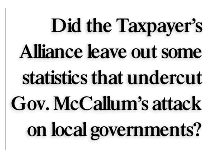Why Gov. McCallum’s Spending Priorities Were Wrong
As the legislature wrestles with the state budget deficit, there has been talk of cutting every level of government except the schools. The momentum for that policy decision was started by Gov. Scott McCallum, who has been accused of favoring the schools in order to win the political support of the state teachers union. Instead, McCallum went after local governments and accused them of being big spenders.
 In fact, the schools are more at fault for the budget problem. It was under former Gov. Tommy Thompson that the state created a bold and really quite ingenious plan to increase the portion of local school budgets paid for by the state. The state would pay for two-thirds of school spending, but to prevent local school districts from increasing their property taxes anyway, the state put a cap on school revenue increases and a limit on how much districts could increase compensation to teachers.
In fact, the schools are more at fault for the budget problem. It was under former Gov. Tommy Thompson that the state created a bold and really quite ingenious plan to increase the portion of local school budgets paid for by the state. The state would pay for two-thirds of school spending, but to prevent local school districts from increasing their property taxes anyway, the state put a cap on school revenue increases and a limit on how much districts could increase compensation to teachers.
Alas, the plan had unintended consequences. Local districts were more likely to pass school building referendums, because the state was now paying two-thirds of the district’s budget. Meanwhile, the cap squeezed some districts while other districts prospered. The school funding system clearly has big problems and needs to be reconsidered. Yet McCallum decided to leave this out of the budget discussion.
Instead, McCallum went after local governments, activating Mayor John Norquist and others, who argued the state was the real big spender. A recent analysis by the Wisconsin Taxpayer Alliance, swallowed whole by the Milwaukee Journal Sentinel, suggested everybody was at fault, as state spending between 1990 and 2000 went up by 85%, compared to 89% by counties, 74% by school districts and 62% by cities. Everybody was spending faster than the modest, 32% rise in the cost of living during this period.
The state also kept spending down by starving Wisconsin counties. Counties are administrative arms of the state that largely do what Madison tells them to do, and often get partial funding for these mandates. In the case of Milwaukee County, for instance, the state increased its spending by 23% during the 1990s, considerably slower than the rate of inflation, meaning the county was forced to increase its contribution to state mandated programs.
None of this is to say the cities or counties weren’t spending too much. (We certainly have learned Milwaukee County was anything but frugal.) But it’s clear the state made a conscious decision to starve cities and counties, while spending tremendously on local schools, (as well as programs like state prisons and highways, which went up far faster than inflation). For McCallum to then blame everything on city and county governments, the very ones he’s been starving, and rule out any cuts to the schools, makes no sense from a public policy perspective. (And given the slim chance the state teachers’ union will back McCallum against a Democrat, it makes no sense from a political perspective.)
Finally, the McCallum approach was manifestly unfair to the City of Milwaukee, which was the only level of government (including the federal government) that did not increase spending faster than inflation during the 1990s. Some observers believe Norquist has cut into bone, and the city infrastructure is suffering as a result. To be rewarded for this with a huge cut in revenue sharing seems like a poor way to encourage thrift.
Is Todd Berry Biased?
The Wisconsin Taxpayer’s Alliance, which is run by Todd Berry, is an interesting group. Its board of directors is stacked with corporate CEOs and others who tend to lean Republican, yet it wrote reports critical of Gov. Thompson’s spending during the 1990s. (Thompson was enraged by some of it.) The WTA stayed true to its mission of discouraging government spending.
Berry was a member of the administration of former Gov. Lee Sherman Dreyfus, and was a key part of the old New Republican Conference, a group of moderate Republicans (who tended to be pro-abortion or social moderates) during the 1970s. Another key member of the group was Scott McCallum, and Berry and his wife Margaret Lewis (then a state representative) were closely allied with McCallum.
Now that McCallum is governor, it will be a test of Berry’s objectivity to report critically on his old associate. By reporting the fact that the schools were big spenders, he helped to undercut the governor’s strategy of not cutting school aids. Berry was also supporting the WTA’s mission of shaming every level of government for their spending. But the statistics I reported above (which I got from Berry, by the way) provide a little more illumination of how government spending worked during the 1990s, and raise further questions about McCallum’s argument that local governments are the main culprit. Perhaps Berry’s group will revisit this issue in the months to come.
Can Ryan Win?
 It’s hard to beat Jim Ryan‘s credentials for county executive. He has a master’s degree from Loyola and followed that with further work at Harvard’s John F. Kennedy School of Government. He was a county supervisor (1980-83), ran the Milwaukee Regional Medical Center, has served as President of the Village of Hales Corners, and has been the chair of the Intergovernmental Cooperation Council (comprised of 19 mayors and village presidents) for 8 years. He knows county government, but has been outside of it for many years, and has been a thoughtful observer of its problems and potential.
It’s hard to beat Jim Ryan‘s credentials for county executive. He has a master’s degree from Loyola and followed that with further work at Harvard’s John F. Kennedy School of Government. He was a county supervisor (1980-83), ran the Milwaukee Regional Medical Center, has served as President of the Village of Hales Corners, and has been the chair of the Intergovernmental Cooperation Council (comprised of 19 mayors and village presidents) for 8 years. He knows county government, but has been outside of it for many years, and has been a thoughtful observer of its problems and potential.
Ryan, by the way, voted against Ament for board chair in the 1980s, but in the years since must have patched things up. As head of the ICC, Ryan had considerable interaction with and access to Ament. He won’t be bragging about that in this campaign.
“The problem for Ryan right now is money,” says Jeff Fleming, who is handling the candidate’s media and advertising. Fleming says Ryan has put $10,000 of his own money into the race and is madly scrambling to raise money. “The money is coming quickly,” Fleming claims, but will it come quickly enough? Opponents like Scott Walker and Tom Nardelli enter the race with big war chests and are likely to be able to afford more TV advertising.
That leaves a lot of ifs, but Ryan is certainly a strong possibility to survive the primary. He is expected to start running commercials next week, which will doubtless be about him rather than his opponents. But he clearly has to take out either Nardelli or Walker. It will be interesting to watch how he tailors his message, and whether its tips off which opponent he wants to kill.
This article was originally published by Milwaukee World.
Murphy's Law
-
Top Health Care Exec Paid $25.7 Million
 Dec 16th, 2025 by Bruce Murphy
Dec 16th, 2025 by Bruce Murphy
-
Milwaukee Mayor’s Power in Decline?
 Dec 10th, 2025 by Bruce Murphy
Dec 10th, 2025 by Bruce Murphy
-
Total Cost of Foxconn Is Rising
 Dec 8th, 2025 by Bruce Murphy
Dec 8th, 2025 by Bruce Murphy





















